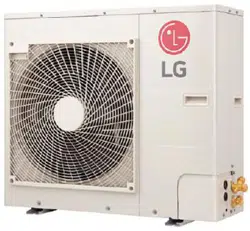Loading ...
Loading ...
Loading ...

Due to our policy of continuous product innovation, some specications may change without notication.
© LG Electronics U.S.A., Inc., Englewood Cliffs, NJ. All rights reserved. “LG ” is a registered trademark of LG Corp.
66 | REFRIGERANT DESIGN
Single Zone Wall Mounted Art Cool™ Premier Engineering Manual
INSTALLATION & LAYOUT BEST PRACTICES
Refrigerant Piping System Layout
Refrigerant Piping / Brazing Practices
Pressure-reducing
Valve
Valve
Taping
Nitrogen
Pipe to
be brazed
Refrigerant
Piping
Figure 33: Refrigerant Pipe Brazing.
It is imperative to keep the piping system free of contaminants and debris such as copper burrs, slag, or carbon dust during installation.
All joints are brazed in the field. Single Zone Wall Mounted Art Cool Premier
refrigeration system components contain very small capillary tubes, small orifices,
electronic expansion valves, oil separators, and heat exchangers that can easily
become blocked. Proper system operation depends on the installer using best
practices and utmost care while assembling the piping system.
• While brazing, use a dry nitrogen purge operating at a minimum pressure of three
(3) psig and maintain a steady flow.
• Blow clean all pipe sections with dry nitrogen prior to assembly.
• Use a tubing cutter, do not use a saw to cut pipe. De-burr and clean all cuts
before assembly.
• Store pipe stock in a dry place. Keep pipe capped and clean.
• Use adapters to assemble different sizes of pipe.
• Do not use flux, soft solder, or anti-oxidant agents.
• Use a 15% silver phosphorous copper brazing alloy to avoid overheating and produce good flow.
• Protect isolation valves, electronic expansion valves, and other heat-sensitive control components from excessive heat with a wet rag or a
heat barrier spray product.
Refrigerant Piping System Insulation
All refrigerant piping, field-provided isolation ball valves, service valves, and long radius elbows shall be completely insulated using closed
cell pipe insulation. The liquid and vapor lines must be insulated separately.
To prevent heat loss/heat gain through the refrigerant piping, all refrigerant piping including liquid lines and vapor lines shall be insulated
separately. Insulation shall be a minimum 1/2″ thick, and thickness may need to be increased based on ambient conditions and local codes.
All insulation joints shall be glued with no air gaps. Insulation material must fit snugly against the refrigeration pipe with no air space between
it and the pipe. Insulation passing through pipe hangers, inside conduit, and/or sleeves must not be compressed. Protect insulation inside
hangers and supports with a second layer. All pipe insulation exposed to the sun and outdoor elements shall be properly protected with PVC,
aluminum vapor barrier, or alternatively placed in a weather-resistant enclosure such as a pipe rack with a top cover, and meet local codes.
The design engineer should perform calculations to determine if the factory-supplied insulation jackets are sufficient to meet local codes and
avoid sweating. Add additional insulation if necessary. Mark all pipes at the point where the insulation jacket ends. Remove the jacket. Install
field-provided insulation on the run-out and main truck pipes first. Peel the adhesive glue protector slip from the insulation jacket and install
the clam-shell jacket over the fitting.
Charging
Each outdoor unit is factory charged (nameplate charge) for the
evaporator as well as a standard 25 foot line. Any time a line set is
used longer then the standard line set length, the refrigerant charge
has to be adjusted.
You must adjust the charge based on how many feet of piping are
added based on 0.22 or 0.38 oz. of R410A per foot. The factory
charge accommodates pipe lengths up to the standard length without
requiring refrigerant removal.
Example: A 50 ft line set is used --
25.4 additional feet x 0.22 oz per ft = Add 5.58 oz
of R410A
If you are uncertain of the unit charge, reclaim, evacuate and weigh in
the correct charge using the unit nameplate (capacity) charge adjust-
ing for line sets longer than 24.6 ft. This will prevent any interruptions
to the functioning of the unit and possible damage.
Capacity
(Btu/h)/Model
Pipe Size
Standard
Length (ft)
Max.
Elevation (ft)
Max.
Length (ft)
Min.
Length (ft)
Additional
Refrigerant (oz/ft)
Vapor Liquid
9k, 12k HYV3 3/8 1/4 24.6 39.4 65.6 9.8 0.22
15k, 18k HYV3 5/8 3/8 24.6 98.4 164 9.8 0.38
24k HYV3 5/8 3/8 24.6 98.4 164 9.8 0.38
Table 39: Charging Capacity.
Loading ...
Loading ...
Loading ...
